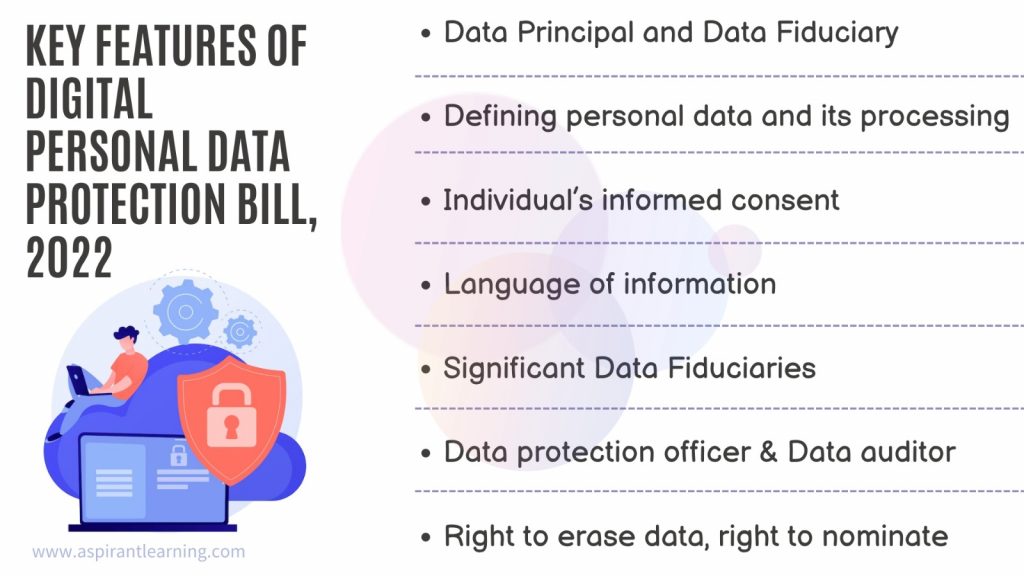News Highlight
New Digital Personal Data Protection Bill in Monsoon Session.
Key Takeaway
- The government advises the Supreme Court, which is hearing petitions against WhatsApp sharing users’ data with Facebook corporations that it would be tabled in Parliament in July.
- On April 11, 2023, the Union government informed the Supreme Court that a new law, the Digital Personal Data Protection Bill 2022, to ensure individual privacy in online space is “ready.”
Digital Personal Data Protection Bill 2022
- Background
- Since 2018, when a panel led by Judge B N Srikrishna prepared a draught version of the Bill, the data protection Bill has been in the works.
- It is India’s first attempt to enact domestic data protection legislation.
- The government revised this draught and tabled it in the Lok Sabha in 2019 as the Personal Data Protection Bill, 2019 (PDP Bill, 2019).
- Owing to the pandemic’s delays, the Joint Committee (JPC) on the PDP Bill 2019 published its report on the Bill two years later, in December 2021.
- A new draught statute accompanied the study, the Data Protection Bill, 2021, which incorporated the JPC’s suggestions.
- However, the government withdrew the PDP Bill in August 2022, citing the JPC’s report and the “substantial revisions” made to the 2019 Bill by the JPC.
- The government is now anticipated to introduce the Bill in Parliament during the 2023 budget session.
- Aim
- Governing the online realm, including distinct legislation on data privacy, the internet ecosystem, cyber security, and telecom regulations.
- As well as leveraging non-personal data to stimulate innovation in the country.
Seven Principles of the DPDP Bill
- Lawful use
- First, “Organisations’ use of personal data must be lawful, fair to the individuals involved, and transparent to individuals.”
- Purposeful dissemination
- According to the second principle, personal data shall only be used for the purposes it was obtained.
- Data minimisation
- The minimum and only necessary data should be collected to achieve a goal.
- Data Accuracy
- At the collection point. There should be no duplicates.
- Duration of storage
- The fifth principle states that personal data should not be “stored indefinitely by default” and should be limited to a fixed period.
- Authorised collection and processing
- There must be sufficient protections to guarantee that “no unauthorised collection or processing of personal data occurs.”
- Accountability of users
- The individual who determines the purpose and means of processing personal data should be held accountable for such processing.
Scope of Present Bill
- The DPDP Law, 2022, relates to all digitally carried out processing of personal data.
- This would encompass both online personal data and offline, personal data that has been digitised for processing.
- In practice, this gives a somewhat lower level of protection because it is fully inapplicable to data processed manually.
- Formerly, draughts only excluded data processed manually by “small entities,” not data processing in general.
- Regarding geographical application, the Bill addresses the processing of personal data.
- Information is gathered by data fiduciaries within Indian territory and processed to provide goods and services within India.
Significance of the revamped Bill
- Strong safeguards: The earlier version of Bill’s fines for data misuse was deemed ineffective as a deterrence.
- The increased penalties recommended now would encourage entities to implement adequate safeguards to protect data and impose fiduciary discipline.
- Businesses would face punitive actions in the form of financial penalties if their data were misused or breached.
- The impending Data Protection Bill would end the exploitation of client data by imposing financial penalties on organisations.
- Under the proposed Bill, there will also be a stringent or purpose limitation on data acquired by companies and a time limit for storing it.
- Data fiduciaries will be expected to discontinue the retention of personal data and destroy previously gathered data after the original purpose for which it was collected has been met.

Conclusion
- It takes a lot of effort to draught such important legislation.
- It may take more trial and error to succeed.
- Creating a comprehensive legal framework will undoubtedly take considerable time and thought.
Pic Courtesy: The Hindu
Content Source: The Hindu



